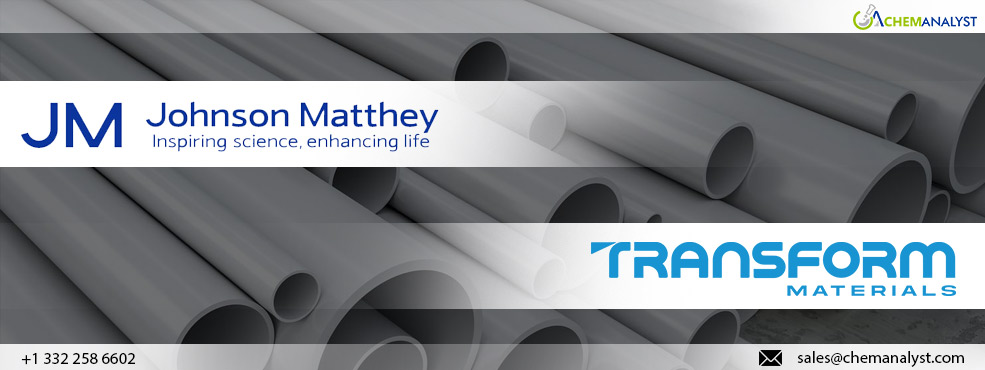Welcome To ChemAnalyst

Transform Materials, a pioneer in clean and sustainable chemical technologies, has partnered with Johnson Matthey, a global leader in sustainable technologies. Leveraging the combined expertise of their scientists and engineers, the two companies aim to revolutionize VCM production with a novel process that reduces carbon emissions and eliminates the use of mercury.
The collaboration combines Transform Materials' cutting-edge technology for producing acetylene from various short-chain hydrocarbons with Johnson Matthey's innovative, mercury-free technology and catalyst for converting acetylene to vinyl chloride monomer (VCM). Acetylene, usually produced through the hydrolysis of calcium carbide, is an essential component in numerous chemical processes.
Calcium carbide is manufactured through an energy-intensive process utilizing coal and limestone as feedstocks, while VCM is converted to PVC through a polymerization reaction. Historically, mercury has been the preferred catalyst for the hydrochlorination of acetylene to produce VCM. However, the global Minamata Convention now prohibits the use of mercury catalysts in new VCM plants. Johnson Matthey's proprietary catalyst provides a compliant solution for both new and existing VCM plants.
Together, the technologies from Transform and Johnson Matthey offer an alternative route to PVC production that significantly reduces global warming impact compared to traditional methods and eliminates the need for mercury catalysts. This innovation addresses three critical industry challenges:
1. Environmental Impact: Traditional PVC production methods rely heavily on coal and mercury catalysts, which pose significant environmental hazards. The collaboration between Transform Materials and Johnson Matthey introduces the use of JM's catalyst to produce VCM from acetylene using a broader range of feedstocks, reducing reliance on harmful substances.
2. Selective Capacity Growth: Unlike traditional ethylene-based PVC production, this new approach allows producers to selectively increase output through the direct conversion of acetylene to VCM, avoiding the formation of major by-products.
3. Carbon Emissions: The traditional carbide process generates carbon monoxide from lime and coal. This collaboration promotes a process that does not emit these carbon by-products, potentially resulting in lower carbon intensity compared to traditional calcium carbide production methods.
" Kenn Flessner, CEO of Transform Materials, expressed enthusiasm about partnering with Johnson Matthey, a company celebrated for its 200-year legacy of innovation and leadership in sustainable technologies. "The PVC industry is in search of new methods to meet production demands while emphasizing sustainability. This partnership enables us to provide an advanced solution that allows PVC producers to boost output incrementally without sacrificing their environmental objectives."
This announcement follows Transform Materials' recent market achievements, including last year's agreement with Denka, a prominent Japanese chemicals company, for the construction of an acetylene-hydrogen plant. The plant is currently under construction and is anticipated to be commissioned in 2025.
"Our partnership with Transform Materials greatly strengthens our value proposition to PVC producers," stated Alan Ingham, Director of Global Licensing at Johnson Matthey. "By combining our advanced hydrochlorination catalyst and VCM technology with Transform Materials' innovative acetylene production methods, we offer PVC manufacturers an appealing solution to increase production capacity while maintaining environmental responsibility. This collaboration aligns with our sustainability objectives and positions us to significantly impact positive change within the PVC industry."
We use cookies to deliver the best possible experience on our website. To learn more, visit our Privacy Policy. By continuing to use this site or by closing this box, you consent to our use of cookies. More info.
